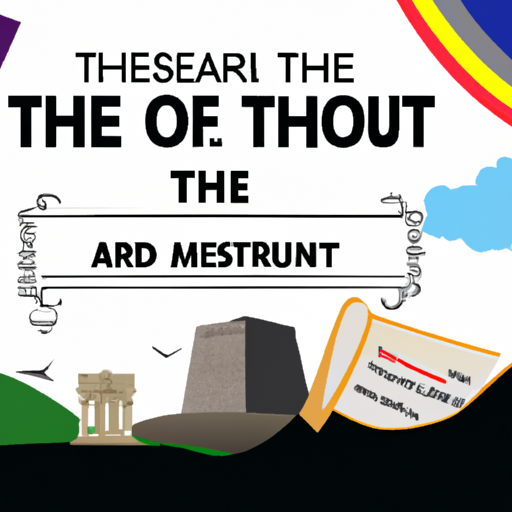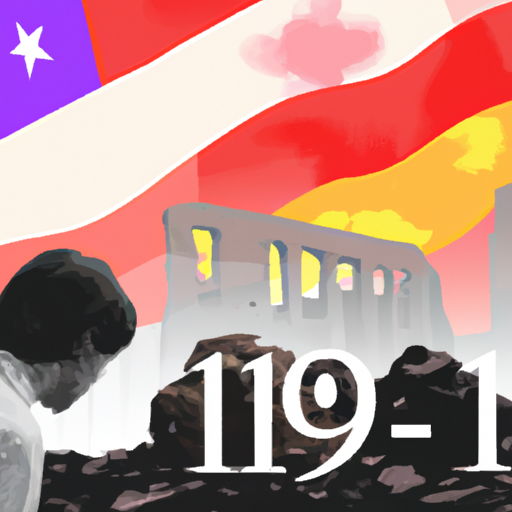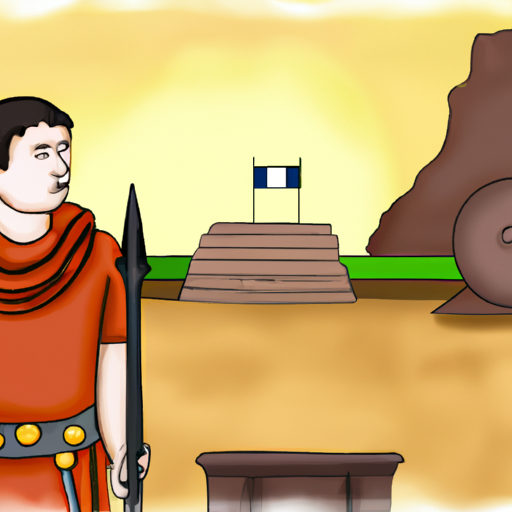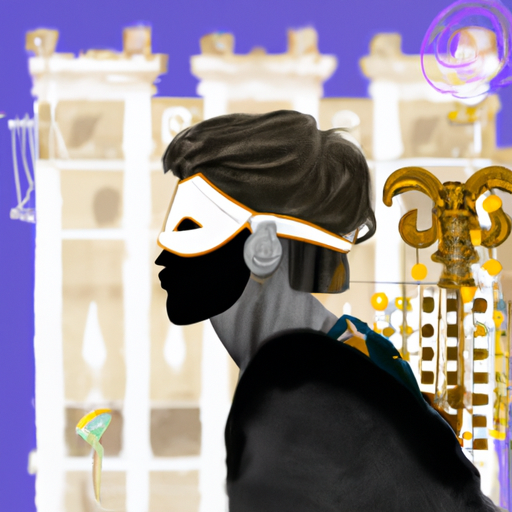History of Iraq Before Islam: Uncovering the People Who Lived There
Unearth the past of Iraq and discover the inhabitants who existed prior to Islam! Delve into the annals of this country to uncover a hidden tale, one that was lived before the advent of one of the world’s most prominent religions. Uncovering such secrets can be an eye-opening experience, a journey through time that reveals an ancient culture and its people. What secrets will you uncover on your journey?

A land of antiquity, Iraq has been home to diverse cultures and civilizations throughout the ages. From Sumerian to Akkadian, Babylonian, Assyrian and Chaldean, this land has seen many rulers come and go with their own languages, customs and beliefs. But what of the people who lived here before Islam? What secrets are hidden in forgotten stories?
The pre-Islamic era of Iraq is filled with a wealth of artifacts that can tell us much about its past inhabitants. Ancient artworks depicting gods and goddesses, as well as items used in religious ceremonies provide clues to the ways these societies functioned. One of the most important sources of information is cuneiform tablets – clay tablets inscribed with symbols used by scribes to record events such as laws or treaties between kings.
Exploring pre-Islamic Iraq can help us gain an appreciation for how much our world has changed since then – for better or worse – as well as how much knowledge we have yet to uncover about this mysterious land’s past. Unearthing these secrets can give us a better understanding of its people and their culture, providing insight into a time that may otherwise remain shrouded in mystery.
.
Introduction

A plethora of civilizations have left their mark on the region now known as Iraq, from the Sumerians and Akkadians to the Babylonians, Assyrians, Persians and Romans. This area has long been a focal point of trade and knowledge throughout antiquity. In 637 CE, an event occurred that would forever shape the future of Iraq: Muslim Arabs led by Umar ibn al-Khattab conquered it, thus introducing Islam to the land and ushering in a new era. Since then, Iraq has become an integral part of Islamic culture and scholarship.
– Ancient Mesopotamian History in Iraq before Islam
A long and remarkable story lies at the heart of Iraq’s past, one which has been shaped by many different civilizations over thousands of years. From the hunter-gatherers of 10,000 BCE to the Sumerians, Babylonians, Assyrians, Persians, Greeks and finally the Arabs who brought Islam in the 7th century CE – each has left their mark on this region.
The earliest evidence of human occupation dates back to around 10,000 BCE with small villages inhabited by hunter-gatherers. By 4th millennium BCE these had developed into an agricultural society with complex irrigation systems used to grow crops such as wheat and barley.
It was during this period that the Sumerians emerged as a great civilization in Iraq around 3200 BCE and developed cuneiform writing for recording important information such as laws and literature. After 2000 BCE they were replaced by the Babylonian Empire which is remembered for its impressive architecture and engineering feats like the Hanging Gardens of Babylon and Ishtar Gate.
In 330 BCE Alexander the Great conquered most of Mesopotamia ushering in a period known as Hellenistic rule where Greek culture spread throughout Iraq before being replaced by Parthian rule in 247 BCE which saw further developments in art, science, mathematics, astronomy and philosophy.
Finally after centuries of foreign rulership came Islam with Arab armies led by Caliph Umar ibn al-Khattab conquering much of Mesopotamia within two decades – thus ending ancient Mesopotamian history before Islamic culture became dominant across much of Middle East up until today.
– Sumerian and Akkadian Empires in Iraq before Islam
The past of Iraq prior to the advent of Islam is imprinted with the presence of two tremendous empires: the Sumerian and Akkadian Empires. These two forces had a significant influence on the growth of civilization in Mesopotamia, reigning from around 2300 BC to 2000 BC. The Sumerians were among the earliest civilizations in world history and their accomplishments in farming, writing, architecture, and mathematics were some of the most advanced for that era. They shaped a system of irrigation canals to bring water to their farms and built grand temple complexes devoted to their gods. Additionally, they invented cuneiform writing which was used all over Mesopotamia until it was superseded by Aramaic during the Babylonian period.
The Akkadians were another ancient culture that began in Mesopotamia shortly after the Sumerians. They are credited with creating one of the first empires in world history, covering much of present-day Iraq as well as components of Syria and Turkey. The Akkadians established a complex system of laws and government which served as an example for future civilizations. Moreover, they made progressions in military technology such as chariots and battering rams.
These two empires left an indelible mark on Iraq’s culture even before Islam arrived there in 622 AD. Their effect can still be seen today in many aspects of Iraqi life ranging from language to architecture to religious beliefs. It is clear that without these two great powers, Iraq would not have been able to evolve into what it is today.
– Pre-Islamic Religious Practices in Iraq
Throughout the ages, Iraq has been a land of deep religious diversity. From the days of ancient Mesopotamian gods such as Anu, Enlil, and Ishtar to the Assyrian religion adopted in the 8th century BC, to Christianity’s arrival in the 1st century AD, to Judaism’s presence from 600 BC until 1948, there has been a constant ebb and flow of different faiths within Iraq.
Today, Islam is the predominant religion in this region yet remnants of earlier beliefs still linger on. Ancient temples, Christian churches, and Jewish synagogues can be found scattered throughout Iraq – testament to its long history before Islam took hold centuries ago.
– Impact of Ancient Cultures on Modern Iraqi Society
The past of Iraq is one that is deeply intertwined with the ancient civilizations that have been a part of its story. From Sumerian, Babylonian, and Assyrian empires to the Persian, Greek, and Roman periods, Iraq has a long and fascinating heritage that still resonates in modern Iraqi society today. Through archaeological discoveries and historical records, we can observe how these bygone eras have left their mark on everything from language and religion to architecture and customs.
The most visible sign of ancient Iraq’s presence is its architectural style. The Sumerians are credited with inventing the arch, which enabled larger construction projects such as ziggurats – towering stepped pyramids utilized for religious ceremonies. This technique was taken up by other civilizations in the region, including the Babylonians who constructed Ishtar Gate – an iconic structure featuring intricate glazed brickwork depicting animals and gods. These structures still influence modern architecture in Iraq today.
Language is another area where ancient cultures have had an indelible effect on contemporary Iraqi society. Many words found in Modern Arabic are derived from Ancient Akkadian – a Semitic language spoken in Mesopotamia during the 2nd millennium BC. Similarly, Aramaic – a language broadly used during the Persian period (550-330 BC) – has also contributed numerous words to Modern Arabic. Thusly, these antiquated languages have helped form the linguistic identity of Iraqis today.
Religion has also been heavily influenced by Iraq’s past civilizations. During Sumerian times (3000-2000 BC), polytheism was practiced with gods representing different aspects of nature such as rivers, storms, and fertility being venerated at temples throughout Mesopotamia. This belief system was later supplanted by monotheistic religions such as Judaism and Christianity following conquests by foreign powers like the Assyrians (1300-612 BC). Today’s predominant faith in Iraq is Islam which was introduced by Arab conquerors in 637 AD but retains many beliefs from earlier religions such as ancestor worship common among pre-Islamic tribes in Arabia and Mesopotamia.
Finally, traditional customs are another area where ancient cultures continue to be felt in modern Iraqi society. For instance, many Iraqis still practice hospitality rituals dating back centuries such as offering visitors coffee or tea upon arrival or exchanging gifts when visiting friends or family members’ homes. Likewise, traditional wedding ceremonies often include elements drawn from Ancient Mesopotamian culture like singing
– Archaeological Evidence of Pre-Islamic Iraq
A plethora of archaeological relics have been unearthed, providing an intriguing glimpse into the civilizations that flourished in Mesopotamia prior to the advent of Islam. From the Sumerians and Akkadians to the Babylonians and Assyrians, these ancient cultures left behind a remarkable array of artifacts that offer insight into their daily lives.
The earliest known inhabitants of Mesopotamia were the Sumerians, who established cities such as Ur and Uruk around 4000 BCE. They developed sophisticated writing and mathematical systems, as well as irrigation techniques for farming. Examples of their legacy can be found in cuneiform tablets, cylinder seals, and sculptures made from clay or stone.
The Akkadians followed suit around 2300 BCE, building upon the achievements of their predecessors by creating a more centralized government structure. They also constructed impressive monuments such as ziggurats –stepped pyramids used for religious ceremonies– along with cylinder seals, jewelry made from gold or lapis lazuli, and inscribed clay tablets documenting legal contracts or treaties between city-states.
In 1792 BCE King Hammurabi’s Babylonian Empire rose to power; they are best remembered for constructing magnificent temples dedicated to various gods such as Marduk and Ishtar. Artifacts from this era include terracotta figurines depicting gods or goddesses, ornately carved stelae recording military victories or royal decrees, and inscribed clay tablets containing stories from mythology or literature written in cuneiform script.
Finally came the Assyrian Empire in 1365 BCE under King Ashurnasirpal II’s rule; it lasted until 612 BCE when it was conquered by the Babylonians. This powerful kingdom left behind large stone reliefs depicting military campaigns or royal hunts, finely crafted ivory furniture pieces decorated with scenes from mythology or everyday life, and inscribed clay tablets detailing administrative records or laws.
These artifacts provide us with an invaluable window into pre-Islamic Iraq’s history and culture; through them we can gain a better understanding of how these civilizations lived, worked, worshipped, traded –and ultimately how they shaped our world today.
conclusion

A past that extends far beyond the dawn of Islam, Iraq has been host to a multitude of civilizations. From the Sumerians and Babylonians, to the Assyrians and Persians, not forgetting its tenure in the Roman Empire, the land has seen its fair share of tumultuous times. Moreover, it was included in the Islamic Caliphate in 637 CE. All this while, Iraq’s character has been one of diversity and harmony; with many cultures and faiths living side by side in serenity.
.
Some questions with answers
Q1: Who lived in Iraq before Islam?
A1: The people who lived in Iraq before Islam were mostly Assyrians and Babylonians.
Q2: When did Islam arrive in Iraq?
A2: Islam arrived in Iraq during the 7th century, when the Rashidun Caliphate conquered Mesopotamia.
Q3: How did Islamic rule affect Iraq?
A3: Islamic rule brought many changes to Iraq, including a new language (Arabic), culture, and laws. It also led to an increase in trade and commerce in the region.
Q4: What was life like for Iraqis under Islamic rule?
A4: Under Islamic rule, Iraqis enjoyed greater religious freedom and were able to practice their faith without fear of persecution. They also experienced improved infrastructure, education, and healthcare.
Q5: How has the history of Iraq changed since then?
A5: Since then, Iraq has experienced numerous wars and conflicts that have had a major impact on its history. In recent years, it has also seen political turmoil and instability due to sectarian violence.





